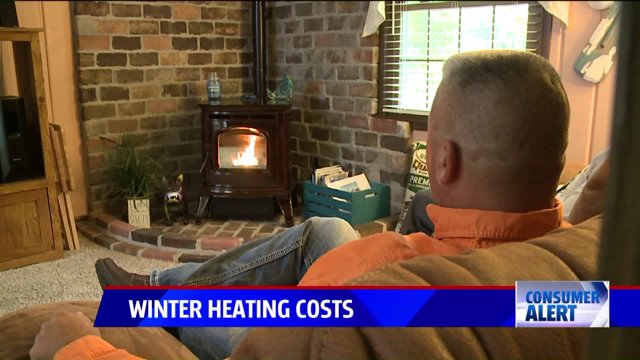COMSTOCK PARK, Mich. - Many people dread heating their homes due to the varying price of fuel. Whether you heat with natural gas, home heating oil or propane, if prices spike and the winter is severe, your bills skyrocket.
But there is another way that is getting more popular that is cheaper and fairly easy to use - fuel pellets.
 Tab DeJonge of Comstock Park just bought a 6,500 BTU Accentra Pellet Stove to heat his home this winter. In the past, he has used a combination of natural gas and a small electric heater. He even tried kerosene, but quit when those prices skyrocketed. He had a wood-burning stove once too, but his wife didn't like the smoke and other issues that come with it. So far this season, he's enjoying his new stove.
Tab DeJonge of Comstock Park just bought a 6,500 BTU Accentra Pellet Stove to heat his home this winter. In the past, he has used a combination of natural gas and a small electric heater. He even tried kerosene, but quit when those prices skyrocketed. He had a wood-burning stove once too, but his wife didn't like the smoke and other issues that come with it. So far this season, he's enjoying his new stove.
"I like a pellet or wood-burning stove because of the natural heat you get," said DeJonge. "It's a constant, radiant heat."
He's also looking forward to a smaller energy bill. He hopes to save 40 to 50% on heating this winter, but some experts say that might be a little optimistic for everyone to enjoy.
Richard Brill, the owner of H2Oasis says that propane bills have dropped some recently, so the $600 - $700 pellet bill might not be that big of a drop, but it could still be a considerable amount for some.
 "I'm going to say that the average pellet customer is probably going to save in excess of $1,000 per year," says Brill.
"I'm going to say that the average pellet customer is probably going to save in excess of $1,000 per year," says Brill.
Currently, you can get a ton of pellets for about $200. Last year, they were about $250 per ton. Other fuel sources have dropped as well, but prices are expected to start going up again this year. The forecasts for this year include:
- Heating Oil - Up 23%
- Natural Gas - Up 12%
- Propane - Up 6%
- Electricity - Up 2%
Experts say pellet stoves are high tech and easy to use, but do require a little bit of maintenance. They run on thermostats, so it is just like running a regular furnace, but you have to clean them. Alec Duyster of The Flame Center in Hudsonville says you have to clean out the blowers and ash pans. DeJonge says it is easy enough for him.
 Experts also say that wood pellets are more environmentally friendly than fossil fuels as well. Brill says that the burning of wood pellets sends less carbon dioxide into the air than wood rotting in the forest.
Experts also say that wood pellets are more environmentally friendly than fossil fuels as well. Brill says that the burning of wood pellets sends less carbon dioxide into the air than wood rotting in the forest.



